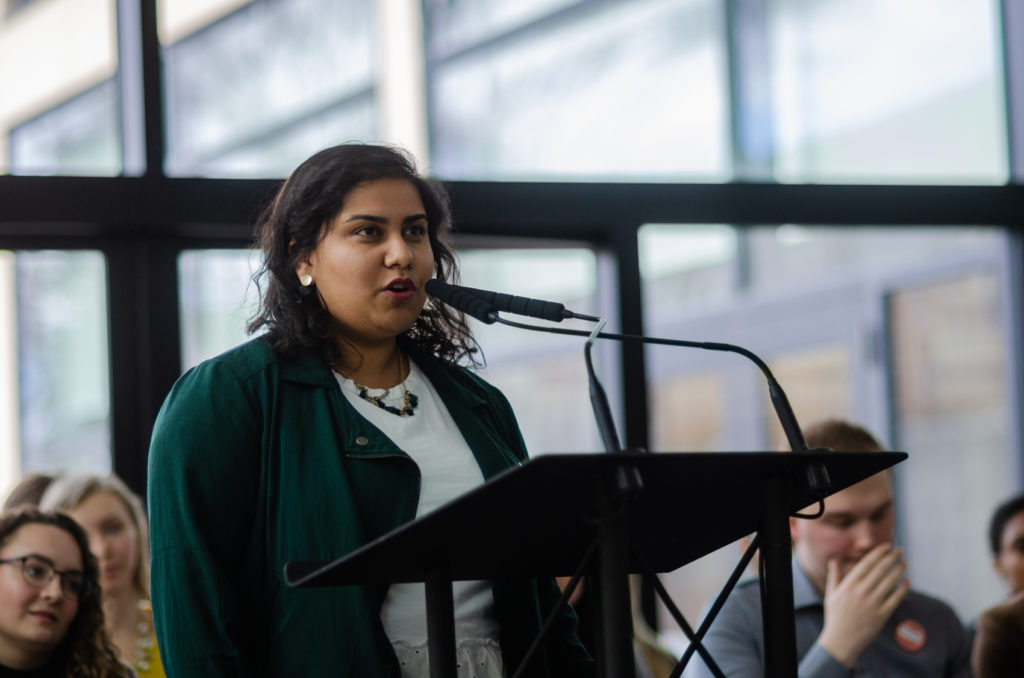Bite the Ballot: Plebiscites and Referendum
How should the student body vote, and how will they?
 Helen Zhang
Helen ZhangPlebiscites

The Landing Plebiscite
I will be frank with you: I’m not impressed with The Landing’s campaign this year. I wish that they would have put more effort into organizing their strategy, especially when LGBTQ+ issues went largely untouched in other campaigns. This was a chance for The Landing to demonstrate their vitality as an organization, and unfortunately, they didn’t do that. The only forum they really did well at was Myer-Horowitz, and that was largely due to Rain Zewde, who is an excellent speaker.
This plebiscite is vital to the operations of The Landing, so it baffles me that they wouldn’t put more effort in. The Landing is a vital service for LGBTQ+ students on campus, and some of them may not have known that the plebiscite was happening this election.
Should it pass?
This plebiscite should pass, but only on the basis of the organization it represents. Despite a disappointing campaign, The Landing is too important not to fund. In addition to this, the fee is only $1.61 per semester, which really isn’t a huge burden.

The Golden Bears and Pandas Legacy Fund Plebiscite
This fund flew relatively under the radar this year, and that’s not necessarily a good thing. They were asked very few questions at forums, and during their statements generally failed to express how the fund would be distributed. From the name, it’s clear that this fund is for the athletics department, but it would have been helpful for students to understand more clearly where exactly their $4.54 per semester is going.
I can’t really excuse them for running a poor campaign, but this fund has been around for a long time, and the athletic department has come to rely on it. Student athletes are not paid, and though their showing was a little weak at forums, they still came, and represented the fund.
Should it pass?
This fund should pass, both because they presented well at forums, and because student athletes deserve our support. Despite the fact that they failed to educate students as to what the purpose of this fund is, it’s still important. I’m voting yes for the Golden Bears and Pandas legacy fund plebiscite, and so should you.
Referendum

The Sustainability and Capital Fund
The Sustainability and Capital Fund (SCF) has been contentious since the beginning of elections. Being such a high fee ($25 a semester), many questions were asked of the SU executives campaigning for the fund throughout the forums. All of these questions were fielded with expert ease, but were the right questions being asked?
Generously, the University of Alberta has 40 thousand students, but when we exclude graduate students, that number is closer to 32 thousand. At $50 per year, per student, that means the Sustainability and Capital fund would generate roughly $1.6 million a year for the Students’ Union.
Of that money, according to the proposal, anywhere from $500 thousand to $1 million would go towards improving accessibility (including the dreaded elevators) in the first 10 years. This is equivalent to just 3 to 6 per cent of the total budget each year. At the same time, just $2.8 million over the first 10 years is dedicated to “major sustainability investments,” or about 18 per cent. If we also include the “sustainability emerging projects fund,” which is $0.9 million over the same 10 year period, only about 23 per cent of this fund will actually be dedicated to sustainability.
The main priority of the fund seems to be the renewal of the Myer-Horowitz Theatre, which is expected to cost $9.7 million in the first 10 years, and a total of $15 to $16 million over a total of 25 years. This means that roughly 61 per cent of the entire budget over 10 years would be dedicated to those renovations. The proposal mentions sustainability not as a primary goal of this endeavour, but a tertiary one; they will replace the light bulbs with LEDs, install solar panels, improve plumbing for greater efficiency, and so on.
For something which will use up well over half of this fund in the first 10 years, I’m not sold on the secondary involvement of sustainability goals. In economic sustainability, the proposal does mention that the space will be able to generate revenue from the greater community, and not just students, after it is renovated.
In an attempt to offset the cost to students, the SU introduced a tiered health and dental plan this year, in addition to funneling more funding into a variety of student bursaries. But in the current financial climate, this simply isn’t enough to justify a mandatory fee as high as the SCF. I’m not guaranteed to get one of those bursaries, but I am guaranteed to spend that money.
Despite the necessity of the Myer-Horowitz renovation, I question why students are being asked the bear the cost. Yes, this fund contributes to sustainability efforts too, but that’s not the majority of what’s in the proposal. For such a high fee, I would expect that the majority of funding to go to sustainability projects, which is the first word in the title. And while every project funded by the SCF will have to include sustainability in their goals, is this enough?
Should it pass?
Put simply, I don’t think this referendum should pass. It puts the burden on students to pay for renovations, and the name of it implies that the majority of the fund will go towards sustainability, which it will not. $25 per semester is a hefty fee, and one students shouldn’t have to take on in this time of economic uncertainty. Perhaps if they revamp this fund to be more geared towards sustainability in the future this would be a viable plan, but for now? It’s asking too much for too little in return.




